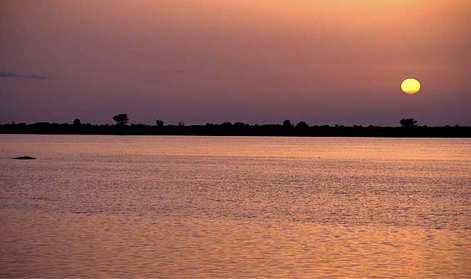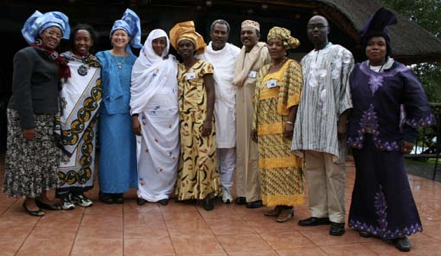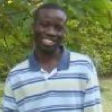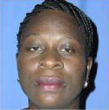2012 July blog
Reggie Annan

Kumasi, Ghana. As is my custom, I start my column with a picture of water, a precious public good. This is the Niger in Western Africa, which extends 4,200 kilometres and runs in a crescent through Guinea, Mali, Niger, Nigeria and Benin.
African Nutrition Leadership Programme
A future for our continent

This June a discussion was shared among graduates of the African Nutrition Leadership Programme (ANLP). This is designed to train leaders in nutrition for Africa, as is done in Europe and in similar programmes run in Asia and Latin America.
Starting the discussion, Johann Jerling, leader of the organising committee (here he is above) said to us: 'We are increasingly being asked what our impact has been on leadership in nutrition in Africa. I would like to challenge you to reflect on what you have done since you participated, to develop your leadership role'. So, I am sharing with readers of this column some of the testimonies of some of the programme graduates, including mine

Here are some participants at an annual meeting of the African Nutrition Leadership Programme, who are seen here during its splendid social event
Several participants in the Leadership Programme since its beginnings as an annual event in 2002, share their experiences here.
My ability to mentor improved

Alex Mokori, Uganda. 'I left the programme more motivated to take charge of leadership in all ways possible. I have mentored a team of 28 young nutritionists from Kyambogo University in Kampala, and they are ready to go out there and make a difference in the nutrition landscape. I have taught final year students to think in terms of real-time aspects of nutrition, and the leadership role they can play within their own spheres of influence is great. I am one of those at the forefront to operationalise the Uganda Nutrition Leadership Programme, which I believe will greatly change the way young nutritionists perceive the profession and the impact they can create in Uganda.
'One of the declarations during our Leadership Programme in 2011 was to use research and advocacy to improve the situation in Africa; I am glad to be part of the dedicated team in Uganda that has driven the nutrition advocacy agenda forward. Our efforts are not only felt in Uganda but globally. Evidence of which is the Uganda Nutrition Action Plan 2011-2016.
'With support from my mentor, I have gone up my programme and organization leadership ladder. My contact points for discussion platform were increased; whenever I am faced with a challenge I know exactly who to get in touch with. The programme definitely has greatly contributed to this. Hopefully the increased number of participants from Uganda this year just hints that we are having leadership influence already. A luta continua! The struggle continues!'
Delegating responsibility

Abizari Abdul-Razak, Ghana. 'Before the Leadership Programme I thought of becoming a leader. Afterwards I knew I was already a leader but just that I had got better at it. In this last month I have delegated responsibility (at work and at home) with ease than I did before. Last week I ceded a travelling opportunity, related to a programme I am coordinating, to a colleague who I thought would benefit more from the trip than me. Hitherto I would not have done so'.
Leading from where I stand

Kingsley Ubaoji, Nigeria 'I have honestly impacted my world. Every opportunity I have had, has been invested in developing new leaders in my home country. "Leading from where you stand". Younger people already know me by this slogan and it is spreading rapidly'.
Advocacy, change agent

Robert Akparibo, Ghana. 'We need a forum like this to reflect our actions – in our workplaces, countries and wherever we are, we can contribute to bring change for nutrition in Africa.
'The School of Health and Related Research at the University of Sheffield is one of the leading public health institutions in the UK. Over 80 per cent of its MPH students are international, many of whom are from Africa. When I joined the School three years ago, doubling as a PhD student and an assistant tutor in public health, I noted a huge gap in the curriculum. There was no module offering teaching on nutrition in the public health programme. In consequence most African students graduated without any basic knowledge that nutrition plays a significant role in the global disease burden, or in addressing global public health problems, as for example the Millennium Development Goals.
'In 2011, I used my leadership skills to advocate as a member of the teaching staff, that this gap be addressed. Today the School has introduced the teaching of nutrition courses such as "key issues in global nutrition" and "nutrition in disaster management or emergency situations" in the public health curriculum. The School is also currently planning to develop a full-time master's programme on public health nutrition. Many African students are now showing interest in doing their dissertation on nutrition topics, because I help to supervise some of their projects. The future is bright for African nutrition'.
Agent of change

Olanike Adeyemo, Nigeria. 'I am an aquatic pathobiologist (I remember Johann was intrigued by my discipline's connection to nutrition, but I am glad I was still selected to participate anyway!). The programme has enabled me critically to appraise where I was at that time, where I was headed, and the best way to get there. I discovered that leadership in nutrition should not be limited only to issues of food security, but food safety as well. That has been my preoccupation since my participation in the programme in 2009 – to direct my research appropriately, and to champion leadership in converting research outcome to policy in order to have the desired result.
'In achieving this, I decided to have a voice where such decisions are made. In 2010 I applied for and was selected to the roster of toxicological and epidemiological experts of the Joint FAO/WHO Expert Committee on Food Additives for the period of 2011-2015. I was also selected to the membership of the Global Young Academy in 2011, and am a member of the policy working group. The African Young Leaders Programme has taught me that to see the change we earnestly desire, we have to seek leadership; then we can truly influence change'.
Create solutions together

Brice Ulrich Saha Foudjo, Cameroon. 'It is wonderful to be asked to reflect on what I have achieved with the skills I got from the Programme. One example is that I have seen a great change in my attitude towards people. It is now easier to understand that people around me don't always think like me when it comes to addressing issues, and that it is possible to bring together those differences and to come out with an exceptional solution. In other words it is from diversity that uniqueness is released. I really think that it is how the several challenges of nutrition in Africa and in the world need to be addressed. Leading is not an ability to give out what you think the solution to a problem is, but allowing the solution to emerge with consultation from your team. When we become conscious of this, we solve problems more quickly.
'I am always happy to understand from colleagues how they have been inspired by my behaviour in facing their day-to-day worries, and in improving their insight in nutrition and their awareness of malnutrition'.
'The Programme has enabled me to redefine my career plan. Because of my leadership competences, I was asked to work with the International Agency for Research on Cancer, an agency of the World Health Organization, on a project related to nutrition and physical (in)activity as determinants of cancer risk in Africa. I can assure you that I never thought of this before in my life, but now the opportunity has been given to me to challenge the natural barriers that I have built around me, observe with great attention, and beyond all understand that nothing is impossible. Even if you yourself are not going see it happen, make sure that people around you share your vision and make it happen. I like to think that I am now a nutrient in Africa that illuminates nutrition and gives it hope. Thank you, the African Nutrition Leadership Programme'.
Empowering civil society

Olubunmi Ashimolowo, Nigeria. 'I was at the Leadership Programme in 2005. I thank God for the training I received and what I have been able to make out of it. Knowledge gained is being used in my teaching activities in the Federal University, Abeokuta, in Ogun State, Nigeria, as well as in my personal research. It is highly rewarding. Greater joy is the setting up of an non-government organisation, the Gender Development Initiative, to take care of the less privileged in the society. There are amazing results. We are online on www.gendiwomen.org. A television series will soon kick off on local television outfits in Nigeria for a start and later on international level. Thanks a lot to all those who support the leadership programme'.
Knitting Africa together

Folake Samuel, Nigeria .'This is a timely question. How much am I applying the knowledge, skills and improved self-esteem gained in the Leadership Programme? Am I doing useful work and making a difference? Can I pause and take a look at what I am doing compared with what I am achieving? How do I know if I am making a difference? I know many Programme graduates have kept working, even in less than ideal and even adverse circumstances. However, the impacts of this on the nutrition landscape, in the different nations that make up Africa, may not yet appear striking. We need to keep on leading and running until we get there.
'It all looks to me like the different coloured yarn that we use in knitting socks. With the tools acquired from the Programme and other training (the knitting needles), we are all weaving different shapes, patterns and sizes of socks for the warmth of our beloved continent. Let's keep at it, so that in years to come we do not litter Africa with unfinished (and unusable) socks – the symbol of dashed hopes.
What difference are we making?

Reginald Annan, Ghana. This is me! I too have met people who have asked me the same questions and who have challenged me. How has the Leadership Programme impacted on the nutrition problems in Africa? After training over 200 people in leadership, why has the nutrition situation not improved? Some say that it is not enough to train people with leadership skills and just leave them to go back to their countries. There should be clear objectives and action plans for the trained people to follow in their respective countries, so that these plans can be evaluated with time. Perhaps so. But let me make some points now:
First, I know by my interaction with many of those who have participated in the Programme that it has impacted on individual leadership skills and qualities for everybody No participant ever leaves and remains the same. The experience remains fresh and is relived many times.
Second, because individual leadership skills have been improved, most participants are now making more difference in their respective disciplines and institutions. For instance, those who are teaching are now mentoring better and helping other young nutritionists to see their leadership potential and to rise up to lead. Those working in programme implementation are now more teamwork-oriented and are talking with others and collaborating better.
Third, many participants are now national leaders in nutrition in their countries. A few have already become international leaders in the field of nutrition. Several of us are also on the way to become leaders for the African continent
Personally, my ability to voice things out and talk about issues of nutrition in Africa and how to deal with them with boldness in a way that many people are afraid to say has been made sharper Specifically, since my participation in the Leaders Programme, I won the first ever Young Scientist Award, organised by the Global Nutrition Leadership Programme I was invited to speak as a young leader to about 3500 participants at the International Congress on Nutrition in Bangkok in 2009; I have been by invitation writing this column for two years now; and in April this year, I was among four keynote speakers invited to speak on global nutrition challenges and opportunities at the Rio2012 conference.
These have been the benefits of the Programme to me personally and to my colleagues. Many more graduates will have had experiences they have not shared. Please do. One may say, Reggie, you had something in you already to lead. If I did, then the Programme helped to bring it out.
There will be longer-term impacts of the skills we have learned which will become manifest much later. One consideration is that the Programme trains younger people who go back to work in their countries where they may well be answerable to people who have not been trained in leadership and are poor leaders. As we the graduates mentor younger ones, the time will come when there will be enough of us to break through and make a greater impact, continentally.
Also with time we will be in the positions of decision making. Then we will be able to make decisions and policies that will address the real underlying and basic challenges to progress in nutrition. I said in last month's column what some of these challenges are. There is a lack of national nutrition policies to guide programme implementation and interventions, and subsequent lack of accountability. There is over-reliance on external support, and a generally poor work force and capacity for programme implementation. There is inability to collaborate multi-sectorally, poor political will, and – which is where our leadership training comes in – as yet poor involvement of the younger nutritionists.
Africa needs nutrition leaders
As beneficiaries of the Programme, we may be biased. It's certain though, judging from these testimonies that the Programme has had an impact on a large number of people, who are making a difference and bringing change for the better. As one of my mentors used to say: 'Do simple things that make a difference'. These graduates are doing just that. Will these differences impact on the nutrition landscape of Africa as a whole? Could ten years of the Programme be enough to have made a difference on our continent?. Or are the nutrition problems in Africa beyond solving with leadership training? Should the Programme be specifically to train people on how to understand and deal with the underlying and basic social, economic – and political – causes of malnutrition? Maybe yes, maybe no. So many questions….
Nutritionists have technical knowledge, skills and competencies to promote the nutritional health and well-being of people, communities and populations. Curricula are tailored to provide that. The training at the Programme provides leadership skills and qualities needed effectively to use such knowledge, skills and competencies in the complex world we work in. I recommend that indicators for measuring the impact of the Programme be worked out between the funders and facilitators. Then a formal balanced and fair evaluation could be organised.
Meanwhile I personally am sure that Africa needs the African Nutrition Leaders Programme, and I also thank everybody who over the years has been dedicated to its creation, development, and success.
Acknowledgement and request
You are invited please to respond, comment, disagree, as you wish. Please use the response facility below. You are free to make use of the material in this column, provided you acknowledge the Association, and me please, and cite the Association’s website.
Please cite as: Annan R [Column].African Nutrition Leadership Programme: A future for our continent. Website of the World Public Health Nutrition Association, July 2012. Obtainable at www.wphna.org.
The opinions expressed in all contributions to the website of the World Public Health Nutrition Association (the Association) including its journal World Nutrition, are those of their authors. They should not be taken to be the view or policy of the Association, or of any of its affiliated or associated bodies, unless this is explicitly stated.
This column is reviewed by Geoffrey Cannon.






